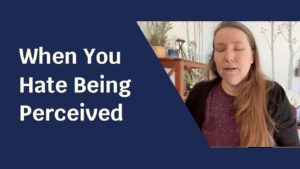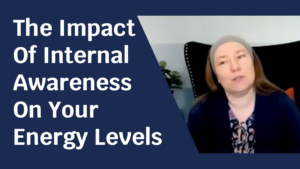
How do you work with people?
So I believe that that you understand how you work best. You may have been taught to ignore that for much of your life, or you might not have spent a lot of time trying to formulate that into words, or figuring it out deeply. Or you might have but there’s still areas you haven’t figured out yet. But you have years of your actual lived experience doing things, and knowing what works and what doesn’t work for you.
So I’m not going to say, “okay, here’s a few tips that work for ADHD, this should work for you,” because they don’t work for everyone.
I tend to work more on figuring out the underlying thoughts in a situation.
Like you’re trying to get this assignment done for work and you want to do it, you need to do it, but you just cannot get yourself to do it. What’s going on? I’m going to ask questions to start noticing your thoughts around it, what’s really going on there?
And there’s usually some sort of painful thought, or an association to something that’s old, or some sort of inner resistance to it. It might be a very practical thing, but even then there’s usually some sort of underlying thought or emotion that’s also influencing you.
And I do a lot of work on dissolving those, resolving, relieving, seeking the truth, and freeing ourselves from the thoughts and beliefs that cause us unnecessary pain.
And usually what happens is when that gets more cleared up, the practical stuff becomes a lot easier. And that’s when your brain will all be automatically be like, “Oh, well I could do this,” or “I work well like this or when I do this kind of thing.”
I often don’t even need to suggest things at that point. Because you know what works for you. You’ve just got a lot of crap in your head from other people telling you that you’re not good at stuff, and you believed it because it seemed like the truth. It feels very true. But usually, it’s not the whole truth.
You believed it because it seemed like the truth. It feels very true. But usually, it’s not the whole truth.
What might be more true is that you’re not good at doing things in a particular way. Because the standard way doesn’t work for your brain, or your motor skills, or your sensory system, or whatever it is.
But if you’re trying to force yourself to do something someone else’s way, and it conflicts with how you function, of course you’re going to get pretty crappy results. And when you do that enough, you’re going to have a lot of bad associations with it.
So when you try and force yourself to do that, of course there’s going to be a lot of resistance. And it may have happened so many times, for so many years, that you don’t even notice what’s going on anymore. It just feels like this is the way things are.
Or it might be more true, that you’ve never actually been taught how to do something. Maybe you just had people assume that telling you to do it was enough, and then criticize you for not catching on. That’s sadly, incredibly common. And we can deconstruct that one, too. And all the other false beliefs that cause unnecessary pain.
So that’s the stuff that I love to work on. When each one of those gets freed up, sure, we can do practical stuff, too. I’ve got lots of those ideas. You probably have lots of ones that work for you a lot better than what I can suggest. But sometimes it’s helpful to get some ideas to get you started.
But I don’t tend to start with practical suggestions. Otherwise you’re just trying to force yourself into someone else’s box.
How do I prepare for sessions?
Here’s a bit on how to prepare for sessions.
A lot of my clients, because we’re all Autistic, we want to be very prepared, have all our ducks in a row, and have a list of all the things that you want to talk through in our sessions together, and that’s great, when it comes naturally, but it doesn’t need to be that clear.
Having an idea of what topic you want to work through might be something like, there’s this thing coming up, and I’d like to have better skills for dealing with it this time. Or I recently had a reaction to something and, intellectually I know it was out of proportion to the actual event, but I still reacted this way and I can’t figure out why, can we figure that out? Or something you’re struggling with. Or that keeps weighing on you and you need to process. Or that you’re having a lot of anxiety around, even though it’s something that you want. The question for the day might be, what’s going on with that? It can be that vague. It’s all right.
So if you have some idea of what you want to talk about, or what you want to be different by the end of a session, that’s helpful. If not, I can help you find something at the beginning of a session. It’s usually pretty easy to find something juicy.
Can I be autistically direct with you?
A little about my communication style.
It might be useful to mention that you can be very direct with me. I am not likely to take offense or assume the worst possible interpretation. So if you have a question or want to tell me something, you don’t need to soft pedal around it or spend a lot of effort trying to figure out how to say it so that I don’t take it the wrong way. If something is phrased awkwardly, I’m not going to interpret that as being rude. You can ask me how many minutes we have left and I’ll simply give you an answer. I’m not going to assume that you’re bored or anything like that.
I’m also likely to just take your comment at face value, think about the merit of whatever you have to say, and respond to that.
As you get comfortable with me, I hope that you can give me feedback about what does and doesn’t work for you. And because I know that’s not always easy right off the bat, when I have an idea of something that might be helpful, I’ll describe what it is and then give you the option about whether you want to do it. And I’ll often ask for confirmation two or three times, and reinforce that you really do get to choose, you don’t have to go along with what I propose out of habit or people pleasing.
And when you say you don’t want to try that or no, that’s not really, my style, or that kind of thing hasn’t worked for me in the past, I’m just going to say okay, and move on. I’m not going to push, or try and talk you into it anything.
By the way, if you ever want me to explain what the point of something is, why I asked something, I can do that. I’ll just give you a direct explanation. I see no value in hiding the how or why of why I do what I do.
You put out so much free info, do I really need one-on-one coaching?
Do you really need 1:1 coaching?
I don’t know. Probably not. Could it be useful? Probably. This isn’t about whether or not you’re capable of figuring stuff out yourself, or whether you could get a lot out of my free materials or the courses or group stuff. I’m sure you can, and I hope you do. I hope you have. That’s what they’re for.
It’s more about: Would you like a shortcut, so you don’t have to figure out everything on your own? Would you like some help personalizing the general info, translating it to your particular life? That’s more of what it’s about.
It’s more about: Would you like a shortcut, so you don’t have to figure out everything on your own?
One thing about the free content I’ve put out, is it’s kind of scattered. It’s, “here’s a thought that I had today,” or “here’s something that came up in my life,” and that’s useful, but it’s not structured content.
The workshops, courses, and ebooks are more structured. They take a specific topic and work through it systematically, but it’s still a fairly high level overview of the topic. It can’t be personalized to every individual. It can address patterns and commonalities that many of us face, but not your particular situation. Still, I hope you can apply a fair amount of it to your particular situation and get a good deal of use out of it. That’s the point of it.
And if that’s what you need at the moment, great, you might not need the one-on-one approach.
As for me, when I’m following other people’s content, I’m a pretty quick learner, and I’m often able to put general concepts into practice on my own. But sometimes, with certain things, I need a little more help in the implementation. Or help seeing aspects of my own situation that I have a hard time seeing for myself, because I’m so enmeshed in it, and an outside perspective helps, especially one that has more experience with the subject than I do. And it can save me a ton of time and effort, and even money, to pay someone who can quickly figure out where I’m getting stuck and who knows how to get unstuck.
The biggest value that people get out of working with me one-on-one is that I can meet them where they are now, figure out what they’re wrestling with now, what’s useful for them at this stage of their journey, and get right to the heart of it.
Are you interested in working with me?
Is the work that I do what you’re looking for (whether you’ve previously been able to articulate it or not)?
First, read about my approach to later discovery autism coaching, and more about my story.
Here’s what sessions with me are like. Is my coaching style a fit for you?
And here’s two more posts answering common questions about coaching with me, including what to expect, what I’m good at, and what I won’t be the right coach for (that’s just as important): FAQs About Coaching with Heather and Coaching with Heather: FAQs on goals and structure.




